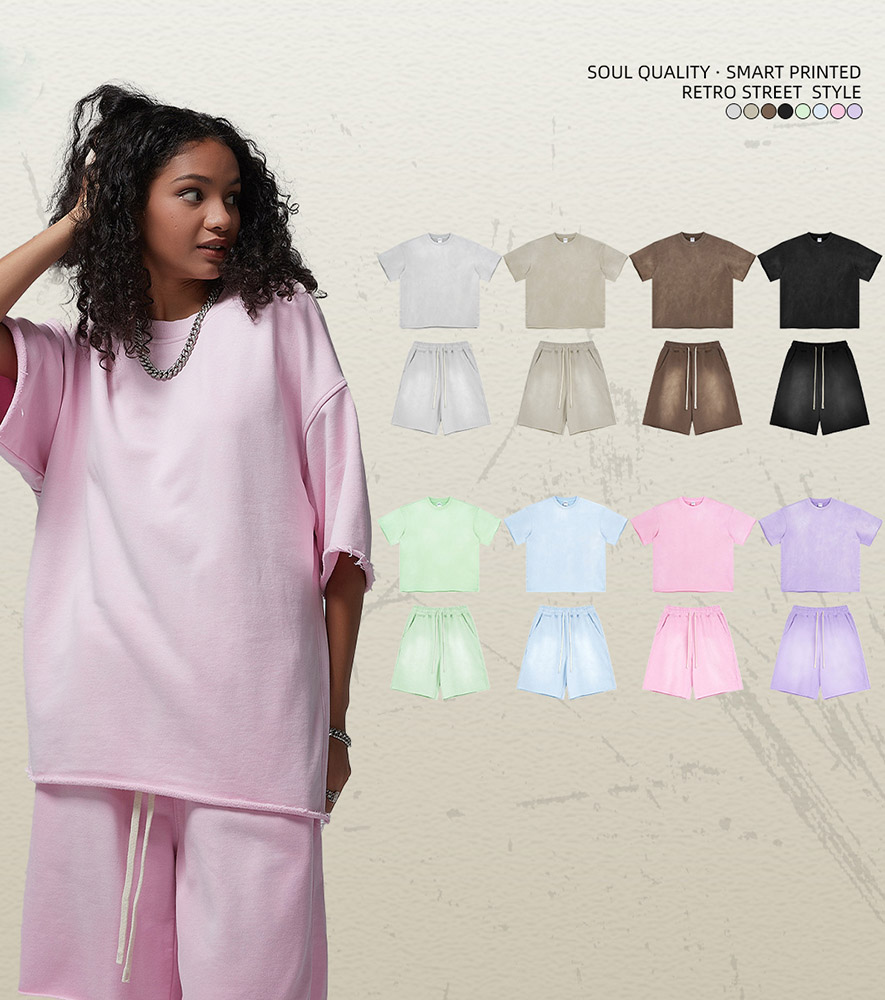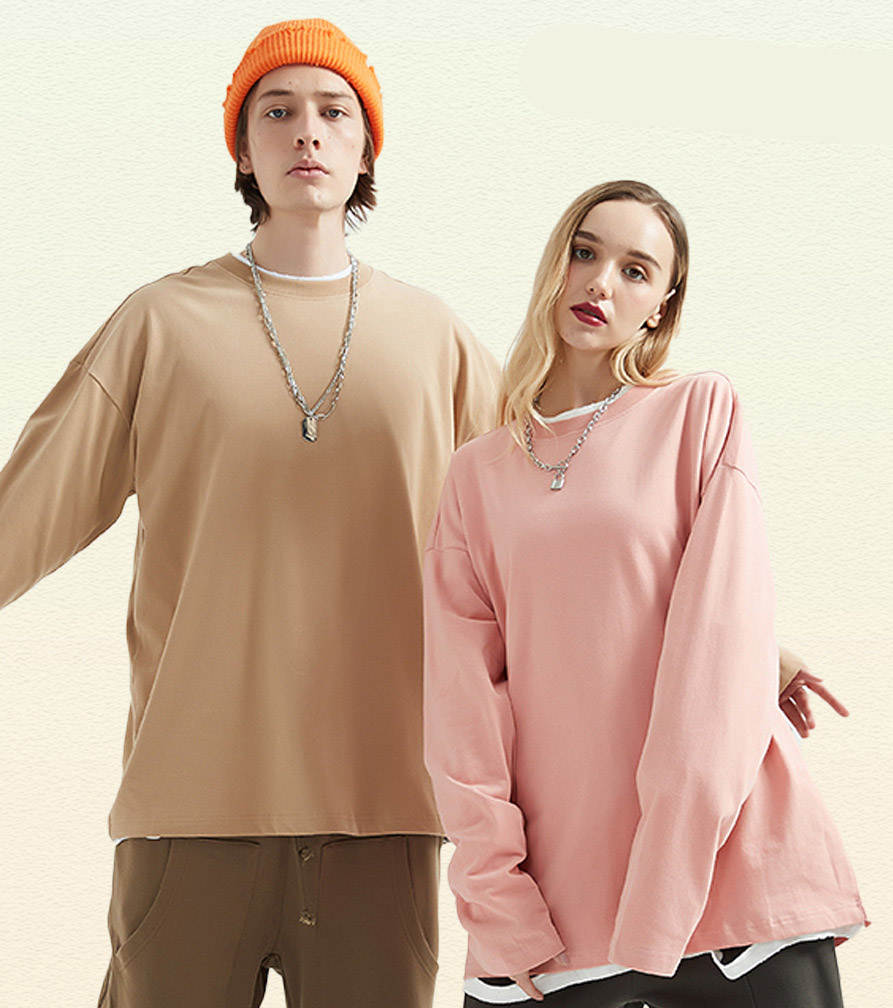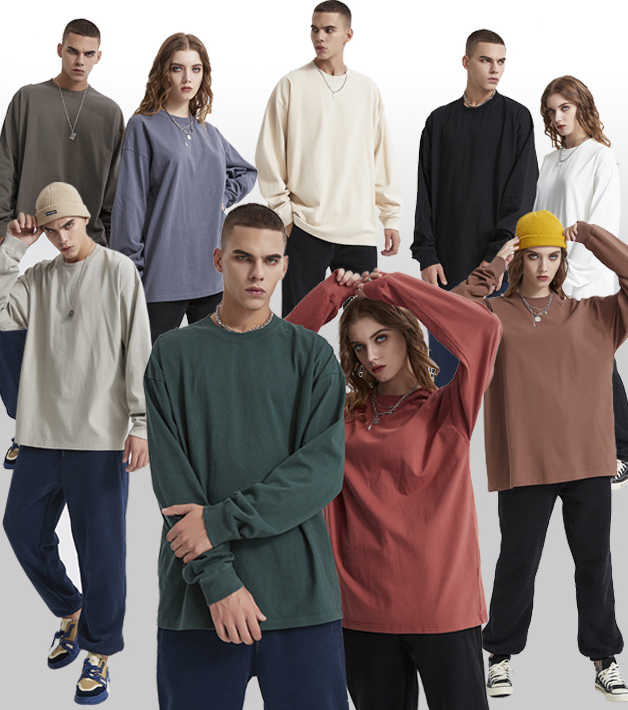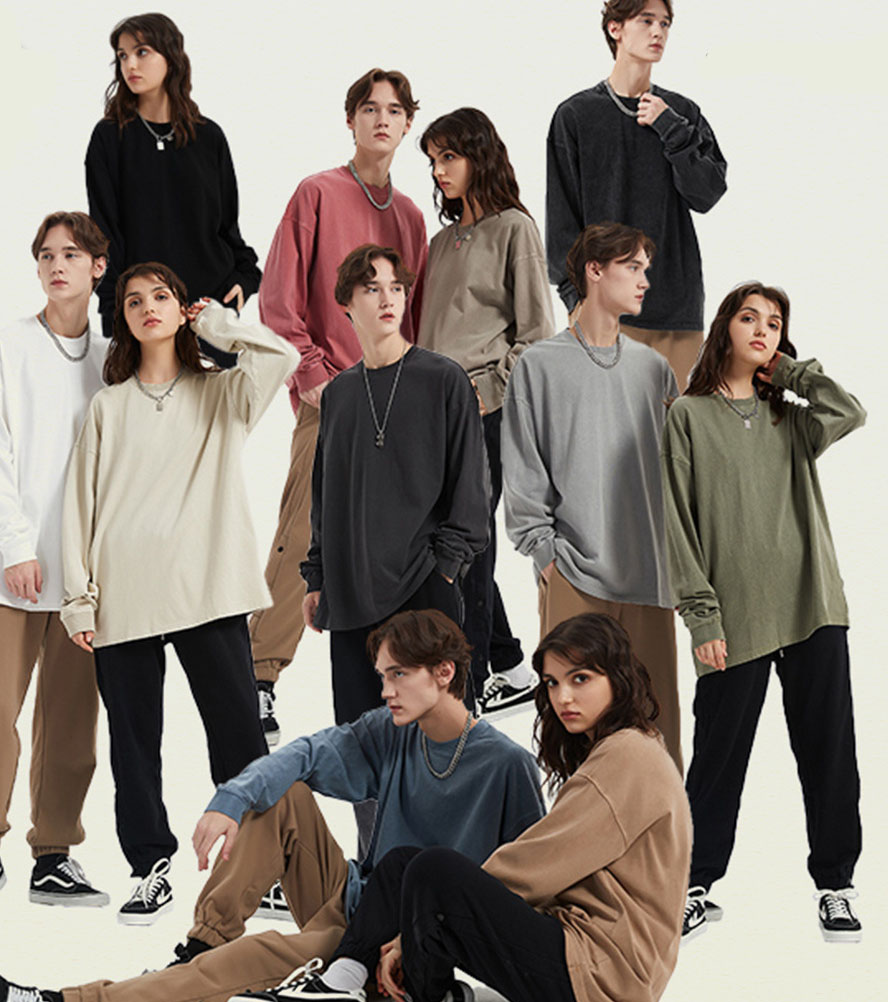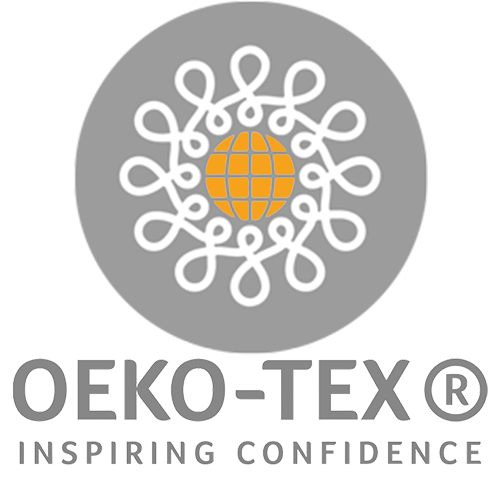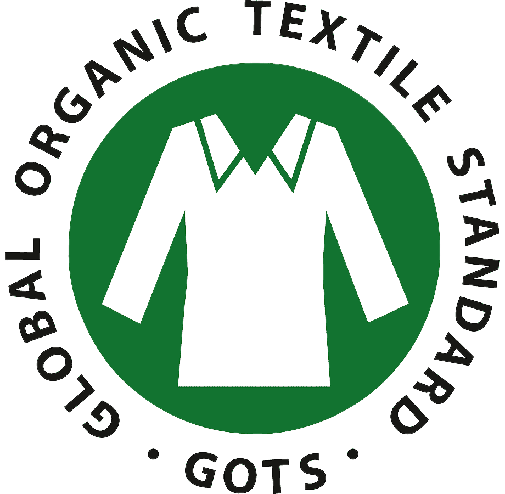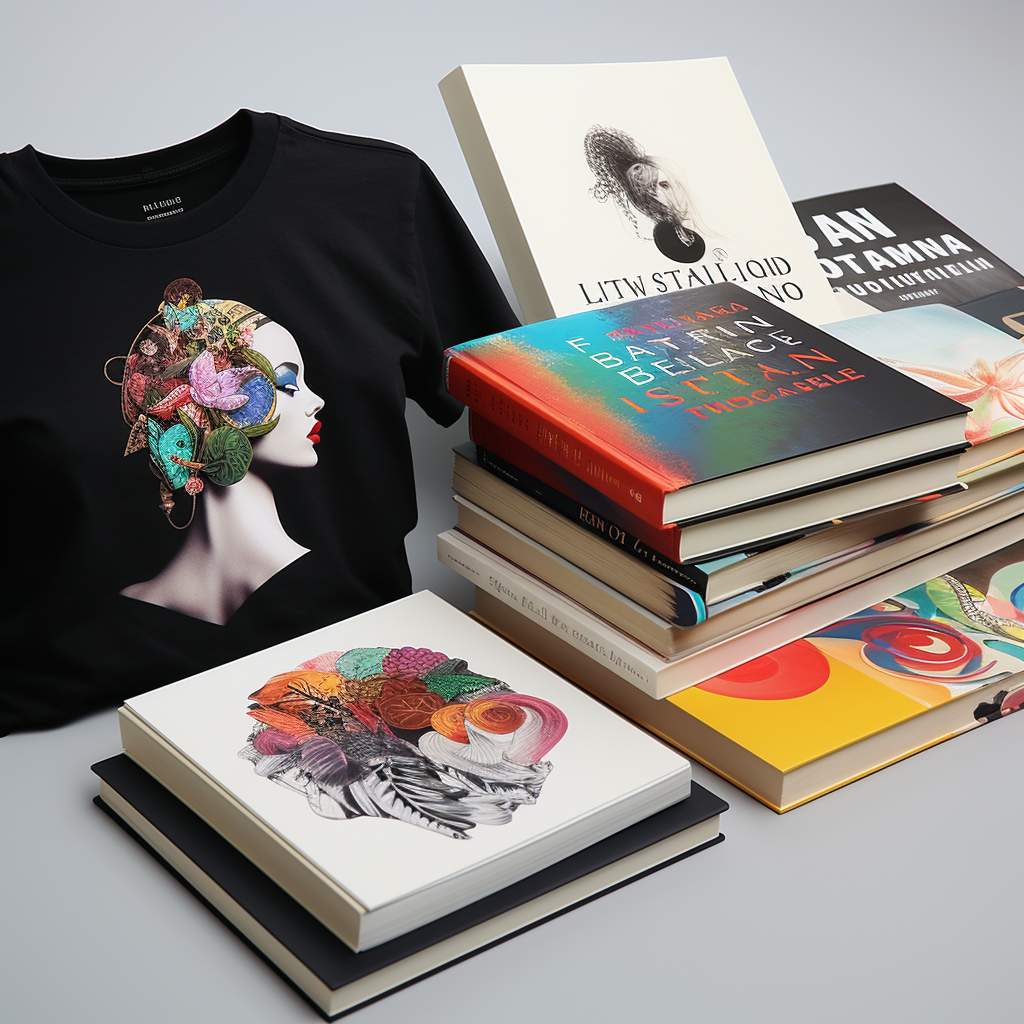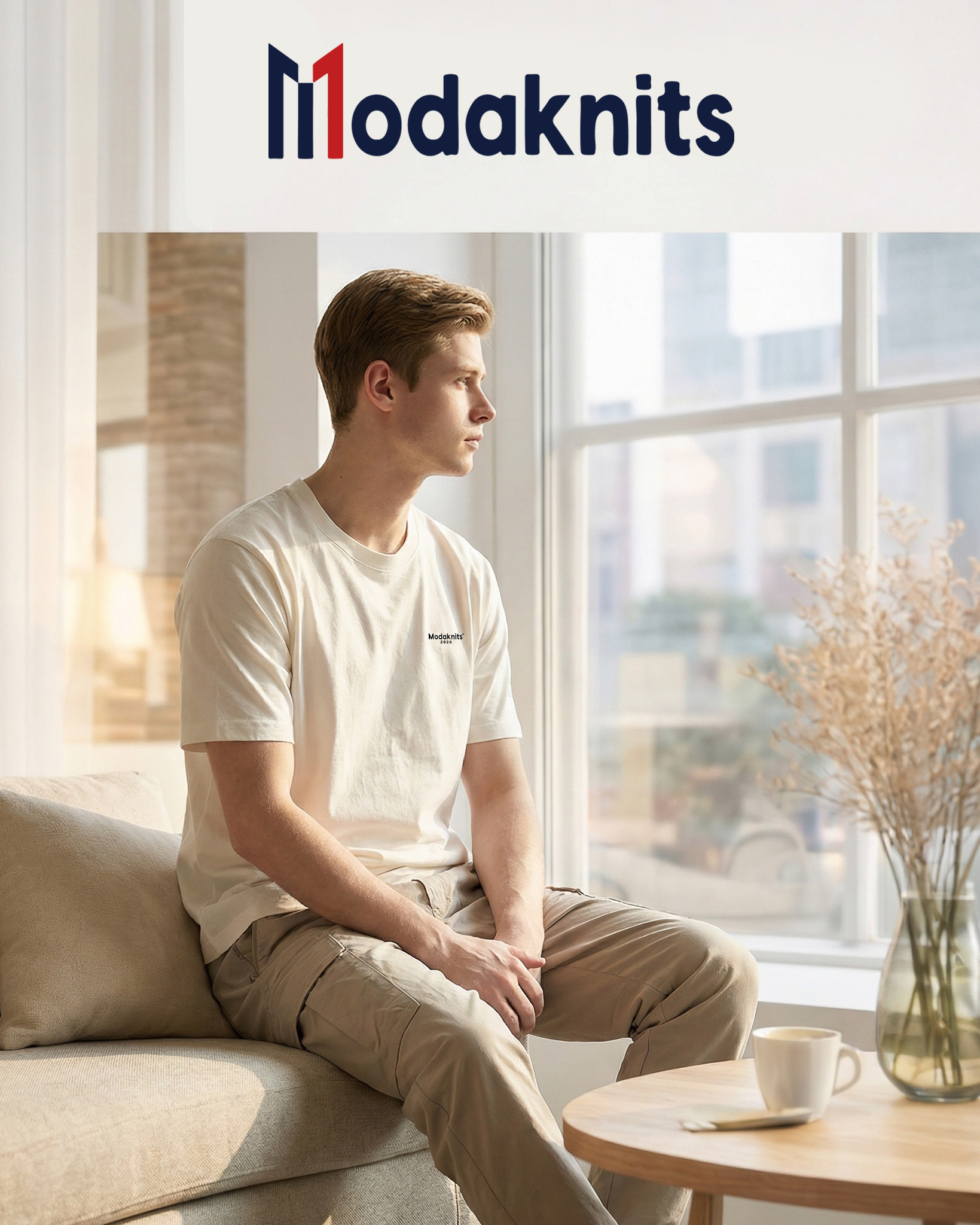The demand for custom apparel t-shirts is on the rise, driven by their versatility and the ability to reflect brand identity and personal expression.
Custom t-shirts are a popular choice for businesses looking to promote their brand, events seeking memorable keepsakes, and individuals wanting unique, personalized apparel.
As a leading clothing manufacturer, Modaknits excels in crafting high-quality custom t-shirts tailored to meet the diverse needs of our clients.
In this blog, we delve into the essential aspects of custom t-shirts from a manufacturing perspective, offering in-depth insights into materials, design options, and production techniques.
What are the benefits of custom apparel t-shirts?
Custom t-shirts offer numerous benefits across various applications:
- Branding:
- Promote Your Brand: Businesses can use custom t-shirts to promote their brand, creating a cohesive and recognizable identity.
- Consistent Image: Custom t-shirts ensure that your team presents a unified image, enhancing brand visibility and professionalism.
- Events:
- Memorable Keepsakes: Custom t-shirts are popular for events such as corporate gatherings, sports teams, and charity runs, serving as memorable keepsakes.
- Team Unity: Wearing matching t-shirts fosters a sense of unity and camaraderie among participants.
- Personal Expression:
- Unique Designs: Individuals can design unique t-shirts to express personal style, commemorate special occasions, or create personalized gifts.
- Creative Outlet: Custom t-shirts allow for creativity and uniqueness, making them a powerful tool for personal expression.
Customization enables businesses, event organizers, and individuals to create distinctive and meaningful apparel that serves various purposes, from marketing and team building to personal expression.
What materials are commonly used for custom t-shirts?
The choice of materials significantly impacts the comfort, durability, and print quality of custom t-shirts.
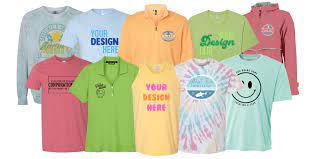
Here are the most commonly used materials and their characteristics:
- Cotton:
- Characteristics: Soft, breathable, and comfortable. Cotton is a natural fiber that feels gentle against the skin and allows air circulation.
- Usage: Ideal for casual wear and everyday use. Cotton t-shirts are perfect for all-day wear, providing a relaxed and comfortable fit.
- Types:
- Combed Cotton: Even softer and more durable due to the removal of short fibers.
- Organic Cotton: Grown without synthetic pesticides or fertilizers, appealing to environmentally conscious consumers.
- Polyester:
- Characteristics: Durable, wrinkle-resistant, and moisture-wicking. Polyester is a synthetic fiber known for its strength and ability to wick away moisture.
- Usage: Suitable for athletic and performance wear. Polyester t-shirts keep the wearer dry and comfortable during physical activities, making them perfect for sports and workouts.
- Types:
- Recycled Polyester: Made from recycled plastic bottles, reducing environmental impact.
- Microfiber Polyester: Ultra-soft and lightweight, providing enhanced comfort.
- Blends:
- Characteristics: Combines the benefits of cotton and polyester, often with added elastane for stretch. Blends offer the softness of cotton and the durability of polyester.
- Usage: Provides a balance of comfort and performance, making these t-shirts versatile for various activities.
- Types:
- Cotton-Polyester Blends: Maintain comfort while adding strength and wrinkle resistance.
- Tri-Blends: A mix of cotton, polyester, and rayon for superior softness, durability, and a vintage feel.
Selecting the right material is crucial for ensuring the t-shirts meet their intended use.
At Modaknits, our expertise in material processing ensures that each fabric is treated to enhance its inherent qualities, resulting in high-quality custom t-shirts that meet the specific needs of our clients.
What printing techniques are used for custom t-shirts?
Various printing techniques are used to create custom t-shirts, each offering unique benefits:
- Screen Printing:
- Process: Involves creating a stencil (screen) and applying ink through the screen onto the fabric.
- Benefits: Produces vibrant, long-lasting prints suitable for large orders. It is cost-effective for bulk production and provides high durability and color accuracy.
- Digital Printing:
- Process: Uses inkjet technology to print directly onto the fabric.
- Benefits: Allows for detailed and multicolored designs, ideal for small to medium orders. It provides a softer feel on the fabric and is excellent for complex and highly detailed graphics.
- Heat Transfer:
- Process: Involves transferring designs onto the fabric using heat and pressure.
- Benefits: Versatile and suitable for intricate designs with multiple colors. It is a good option for smaller orders and customizations, though it may not be as durable as screen printing or digital printing over time.
Choosing the appropriate printing technique depends on the design complexity, order size, and intended use of the t-shirts.
At Modaknits, we ensure that each method is executed with precision to achieve the best results, tailored to the specific needs of our clients.
How do manufacturers ensure the quality of custom t-shirts?
Ensuring the quality of custom t-shirts involves several meticulous steps, each designed to maintain high standards and deliver superior products:
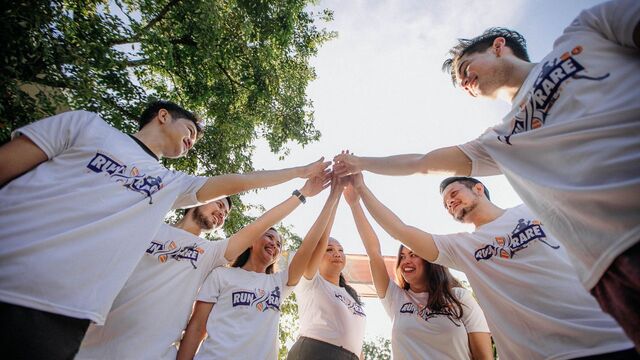
- Fabric Selection:
- High-Quality Materials: Sourcing premium raw materials from trusted suppliers ensures the integrity and performance of the fabric.
- Supplier Verification: Conducting thorough checks on suppliers to ensure they meet required quality standards and ethical practices.
- Precision Cutting and Stitching:
- Advanced Machinery: Utilizing state-of-the-art machinery for precise cutting to maintain consistency in size and shape.
- Skilled Labor: Employing experienced and skilled workers to perform accurate stitching, ensuring each t-shirt is crafted to perfection.
- Quality Threads: Using high-quality threads that complement the fabric, enhancing the durability and appearance of the t-shirts.
- Printing Quality Control:
- Design Verification: Ensuring that the designs are correctly formatted and color-matched before printing begins.
- Print Accuracy Checks: Conducting inspections during and after printing to ensure the accuracy of the prints, including alignment and color consistency.
- Durability Testing: Performing tests on printed t-shirts to check for colorfastness and durability, ensuring prints remain vibrant and intact after multiple washes.
- General Quality Control:
- Multiple Inspections: Each production batch undergoes rigorous inspections at various stages, from raw material checks to final product assembly.
- Sample Testing: Creating sample products for client approval before mass production begins to ensure satisfaction with the final product.
- Adherence to Standards: Ensuring compliance with industry standards and certifications to guarantee the safety and reliability of the t-shirts.
- Packaging and Shipping:
- Protective Packaging: Using packaging that protects the t-shirts during transit, preventing damage and maintaining their quality.
- Detailed Labeling: Providing clear and detailed labeling for easy identification and traceability.
Adhering to these meticulous steps helps maintain the reputation of both the manufacturer and the brands we collaborate with, ensuring that each custom t-shirt meets the highest standards of quality and performance.
What design options are available for custom t-shirts?
Custom t-shirts offer a wide range of design options, allowing for creativity and personalization to meet various needs:
- Colors:
- Vast Palette: A broad selection of colors is available to match brand guidelines, event themes, or personal preferences.
- Custom Shades: Ability to create specific shades or Pantone colors to ensure brand consistency.
- Graphics:
- Custom Graphics and Logos: Ability to print custom graphics, logos, and images in various styles and sizes.
- High-Resolution Printing: Ensuring that graphics are printed with high resolution for clarity and detail.
- Text:
- Personalized Text: Options to add slogans, names, messages, and other text elements.
- Various Fonts and Sizes: A range of fonts and text sizes to fit different design aesthetics and purposes.
- Additional Design Elements:
- Placement Options: Flexibility in placing designs on different areas of the t-shirt, such as front, back, sleeves, or even the hemline.
- Special Effects: Options for special printing effects like metallic finishes, glitter, puff prints, and more.
Manufacturers work closely with clients to bring their design visions to life. This involves providing guidance on:
- Color Choices: Advising on the best color combinations to ensure visual appeal and brand alignment.
- Graphic Placement: Offering recommendations on the optimal placement of graphics and logos for maximum impact.
- Text Formatting: Assisting with the selection of fonts, text sizes, and formatting to ensure readability and aesthetic harmony.
By collaborating closely with clients, manufacturers ensure that the final product meets expectations and delivers a high-quality, personalized t-shirt that effectively communicates the desired message or brand identity.
How does the customization process work for t-shirts?
The customization process for t-shirts involves several key steps, ensuring that the final product meets the client’s expectations and maintains high standards of quality:

- Design Submission:
- Client Input: Clients submit their designs, including graphics, text, and color specifications. This initial step sets the foundation for the entire customization process.
- Review and Consultation:
- Expert Feedback: Our team reviews the submitted designs and provides feedback or suggestions to optimize the final product. This may involve adjustments for better print quality or suggestions for color matching.
- Consultation: We work closely with clients to refine their ideas and ensure the design aligns with their vision and branding.
- Sample Production:
- Prototype Creation: A sample t-shirt is produced based on the finalized design. This prototype serves as a tangible representation of the final product.
- Client Approval: The sample is presented to the client for approval. Any necessary adjustments are made based on client feedback.
- Mass Production:
- Bulk Manufacturing: Once the sample is approved, the t-shirts are produced in bulk. We adhere to the agreed specifications to ensure consistency across all units.
- Efficiency: Our advanced machinery and skilled labor ensure efficient and accurate production.
- Quality Control:
- Rigorous Inspections: Each production batch undergoes thorough inspections to ensure consistency and quality. This includes checks for print accuracy, colorfastness, and overall garment integrity.
- Final Approval: Before shipping, a final quality check is conducted to confirm that all products meet our high standards.
This collaborative process ensures that the final custom t-shirts not only meet but exceed client expectations.
By involving clients at every step and maintaining stringent quality controls, we produce t-shirts that are tailored to specific needs and produced to the highest standards of quality.
What are the latest trends in custom apparel t-shirts?
Current trends in custom t-shirts reflect evolving consumer preferences and advancements in technology.
Here are some of the key trends:
- Sustainable Materials:
- Eco-Friendly Fabrics: There is an increasing use of organic cotton, recycled polyester, and other sustainable materials. These fabrics reduce environmental impact and appeal to eco-conscious consumers.
- Innovative Features:
- Advanced Technologies: Custom t-shirts now often incorporate moisture-wicking technologies, UV protection, and antimicrobial treatments. These features enhance functionality, making the t-shirts suitable for various activities and environments.
- Bold Designs:
- Unique Patterns and Vibrant Colors: There is a strong emphasis on bold, eye-catching designs. Custom t-shirts feature unique patterns, vibrant colors, and statement graphics that stand out and make a lasting impression.
- Customization Options: Advances in printing technology allow for highly personalized designs, enabling intricate details and a wide range of colors to be used effectively.
Staying updated with these trends is crucial for manufacturers. By incorporating sustainable materials, innovative features, and bold designs, we ensure that our custom t-shirts are both appealing and relevant to contemporary consumer preferences.
This approach helps us meet the demands of a diverse market while maintaining high standards of quality and creativity.
Conclusion
Custom apparel t-shirts seamlessly combine creativity, functionality, and personal expression, all backed by meticulous manufacturing processes.
At Modaknits, we are committed to producing high-quality custom t-shirts that cater to the diverse needs of businesses, event organizers, and individuals.
We invite you to explore our manufacturing services and collaborate with us to create exceptional custom apparel that resonates with your audience and meets your specific requirements.




